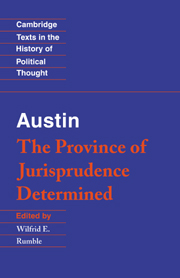Book contents
- Frontmatter
- Contents
- Acknowledgements
- Introduction
- Note on the text
- Chronology of John Austin's life
- Selected bibliography
- Biographical notes
- The Province of Jurisprudence Determined
- Abstract of Lectures
- Analysis of Lectures
- Lecture I.
- Lecture II.
- Lecture III.
- Lecture IV.
- Lecture V.
- Lecture VI.
- Index
- Cambridge Texts in the History of Political Thought
Lecture V.
Published online by Cambridge University Press: 02 December 2009
- Frontmatter
- Contents
- Acknowledgements
- Introduction
- Note on the text
- Chronology of John Austin's life
- Selected bibliography
- Biographical notes
- The Province of Jurisprudence Determined
- Abstract of Lectures
- Analysis of Lectures
- Lecture I.
- Lecture II.
- Lecture III.
- Lecture IV.
- Lecture V.
- Lecture VI.
- Index
- Cambridge Texts in the History of Political Thought
Summary
the term law, or the term laws, is applied to the following objects: – to laws proper or properly so called, and to laws improper or improperly so called: to objects which have all the essentials of an imperative law or rule, and to objects which are wanting in some of those essentials, but to which the term is unduly extended either by reason of analogy or in the way of metaphor.
Strictly speaking, all improper laws are analogous to laws proper: and the term law, as applied to any of them, is a metaphorical or figurative expression.
For every metaphor springs from an analogy: and every analogical extension given to a term is a metaphor or figure of speech. The term is extended from the objects which it properly signifies to objects of another nature; to objects not of the class wherein the former are contained, although they are allied to the former by that more distant resemblance which is usually styled analogy. But, taking the expressions with the meanings which custom or usage has established, [there is a difference between an employment of a term analogically and a metaphor.
Analogy is a species of resemblance. The word resemblance is here taken in that large sense, in which all subjects which have any property in common, are said to resemble.
- Type
- Chapter
- Information
- Austin: The Province of Jurisprudence Determined , pp. 106 - 163Publisher: Cambridge University PressPrint publication year: 1995



